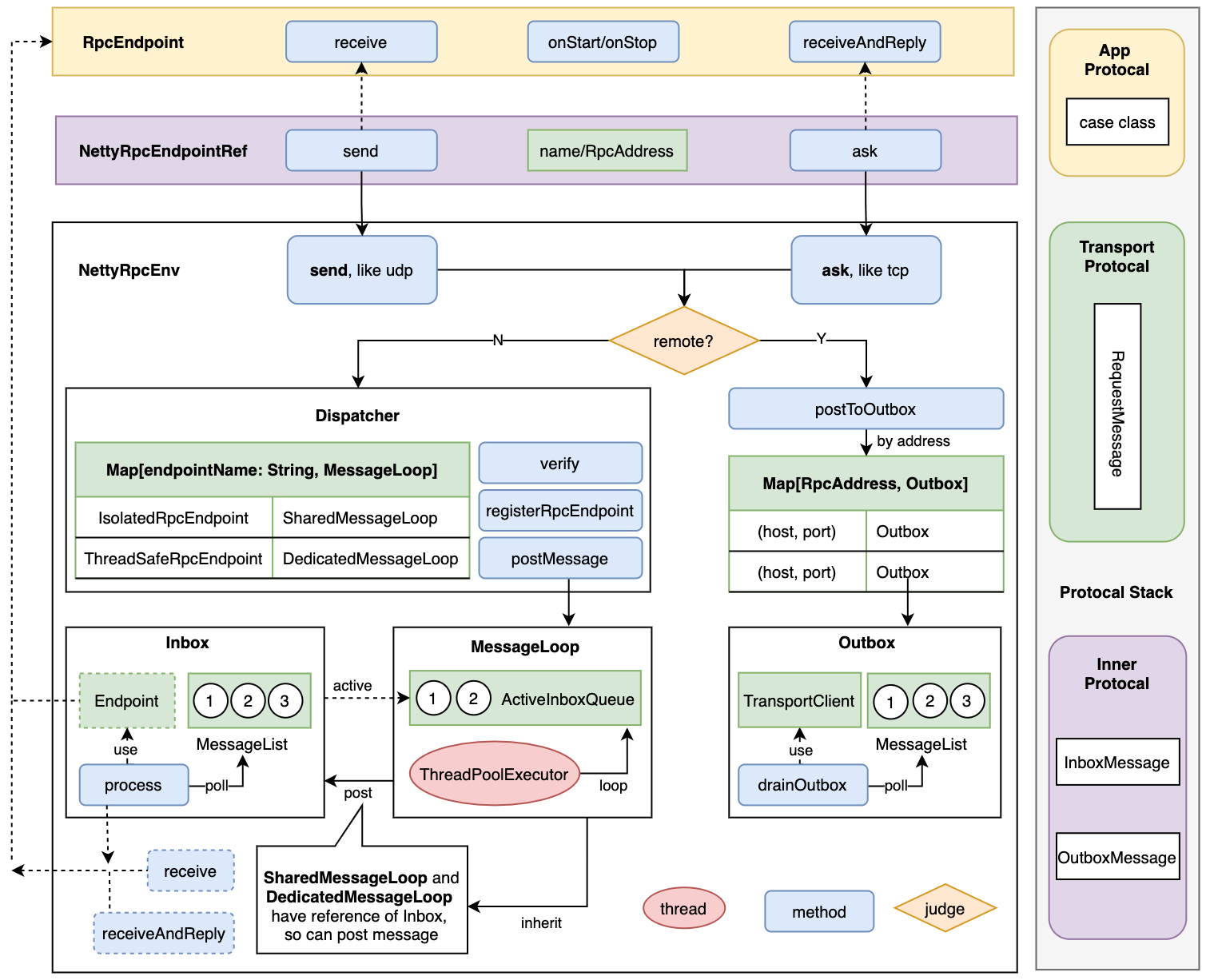The implement with ZIO is here. It's more easier than this one.
Spark drop akka dependence sence 2.0, and rewrite self rpc module(basic on Netty). But it copy a lot concept from Akka Actor. This project take only rpc part from Spark source code, and make it run independently.
zio actor is here
I write simple code to compare both of them. It's very similar, some concept mapping like this:
- RpcEndpoint -> Actor
- RpcEndpointRef -> ActorRef
- RpcEnv -> ActorSystem
You will better understand it with below program.
- Java 1.8
- Scala 2.13.8
1, open shell terminal at this project root dir
2, $> sbt
3, $> runMain xyz.sourcecodestudy.rpc.example.HelloWorldMain
4, $> runMain xyz.sourcecodestudy.rpc.akka.HelloWorldMain
// All details of console output
changzhi@changzhi spark-rpc % sbt
[info] welcome to sbt 1.6.2 (Oracle Corporation Java 1.8.0_191)
[info] loading project definition from /Users/changzhi/Scala/github/spark-rpc/project
[info] loading settings for project spark-rpc from build.sbt ...
[info] set current project to spark-rpc (in build file:/Users/changzhi/Scala/github/spark-rpc/)
[info] sbt server started at local:///Users/changzhi/.sbt/1.0/server/96df759d83040ce5c3db/sock
[info] started sbt server
sbt:spark-rpc> runMain xyz.sourcecodestudy.rpc.example.HelloWorldMain
[info] running xyz.sourcecodestudy.rpc.example.HelloWorldMain
2022-09-04 10:16:11 INFO HelloWorld: Hello World!
2022-09-04 10:16:11 INFO HelloWorldBot: Greeting 1 for World
2022-09-04 10:16:11 INFO HelloWorld: Hello World!
2022-09-04 10:16:11 INFO HelloWorldBot: Greeting 2 for World
2022-09-04 10:16:11 INFO HelloWorld: Hello World!
2022-09-04 10:16:11 INFO HelloWorldBot: Greeting 3 for World
[success] Total time: 7 s, completed 2022-9-4 10:16:11
sbt:spark-rpc> runMain xyz.sourcecodestudy.rpc.akka.HelloWorldMain
[info] running xyz.sourcecodestudy.rpc.akka.HelloWorldMain
SLF4J: akka.event.slf4j.Slf4jLogger
SLF4J: The following set of substitute loggers may have been accessed
SLF4J: during the initialization phase. Logging calls during this
SLF4J: phase were not honored. However, subsequent logging calls to these
SLF4J: loggers will work as normally expected.
SLF4J: See also http://www.slf4j.org/codes.html#substituteLogger
[success] Total time: 2 s, completed 2022-9-4 10:16:22
2022-09-04 10:16:22 INFO HelloWorld$: Hello World!
2022-09-04 10:16:22 INFO HelloWorldBot$: Greeting 1 for World
2022-09-04 10:16:22 INFO HelloWorld$: Hello World!
2022-09-04 10:16:22 INFO HelloWorldBot$: Greeting 2 for World
2022-09-04 10:16:22 INFO HelloWorld$: Hello World!
2022-09-04 10:16:22 INFO HelloWorldBot$: Greeting 3 for World
sbt:spark-rpc> exit
[info] shutting down sbt server
// xyz.sourcecodestudy.rpc.example.HelloWorld.scala
case class Greet(whom: String, replyTo: RpcEndpointRef)
case class Greeted(whom: String, from: RpcEndpointRef)
class HelloWorld(override val rpcEnv: RpcEnv) extends RpcEndpoint with Logging {
override def receive: PartialFunction[Any, Unit] = {
case Greet(whom, replyTo) => {
logger.info(s"Hello ${whom}!")
replyTo.send(Greeted(whom, self))
}
}
}
class HelloWorldBot(override val rpcEnv: RpcEnv, max: Int) extends RpcEndpoint with Logging {
private var replyTimes = 0
override def receive: PartialFunction[Any, Unit] = {
case Greeted(whom, from) => {
replyTimes += 1
logger.info(s"Greeting ${replyTimes} for ${whom}")
if (replyTimes < max) {
from.send(Greet(whom, self))
} else {
rpcEnv.shutdown()
}
}
}
}
object HelloWorldMain {
def apply(message: String): Unit = {
val settings = new RpcSettings()
val rpcEnv = RpcEnv.create("hello", "127.0.0.1", 9999, 1, settings)
val greeter = rpcEnv.setupEndpoint("greeter", new HelloWorld(rpcEnv))
val replyTo = rpcEnv.setupEndpoint("replyer", new HelloWorldBot(rpcEnv, max = 3))
greeter.send( Greet(message, replyTo) )
rpcEnv.awaitTermination()
}
def main(args: Array[String]): Unit = {
val message = args.toSeq match {
case head :: tail => head
case Nil => "World"
}
HelloWorldMain(message)
}
}
// xyz.sourcecodestudy.rpc.akka.HelloWorld
final case class Greet(whom: String, replyTo: ActorRef[Greeted])
final case class Greeted(whom: String, from: ActorRef[Greet])
object HelloWorld {
def apply(): Behavior[Greet] = Behaviors.receive { (context, message) =>
context.log.info("Hello {}!", message.whom)
message.replyTo ! Greeted(message.whom, context.self)
Behaviors.same
}
}
object HelloWorldBot {
def apply(max: Int): Behavior[Greeted] = {
bot(0, max)
}
private def bot(greetingCounter: Int, max: Int): Behavior[Greeted] =
Behaviors.receive { (context, message) =>
val n = greetingCounter + 1
context.log.info("Greeting {} for {}", n, message.whom)
if (n == max) {
Behaviors.stopped
} else {
message.from ! Greet(message.whom, context.self)
bot(n, max)
}
}
}
object HelloWorldMain {
def apply(message: String): Behavior[SpawnProtocol.Command] = {
Behaviors.setup { context =>
val greeter = context.spawn(HelloWorld(), "greeter")
val replyTo = context.spawn(HelloWorldBot(max = 3), "replyer")
greeter ! Greet(message, replyTo)
SpawnProtocol()
}
}
def main(args: Array[String]): Unit = {
val message = args.toSeq match {
case head :: tail => head
case Nil => "World"
}
// Init
ActorSystem(HelloWorldMain(message), "hello")
}
}
